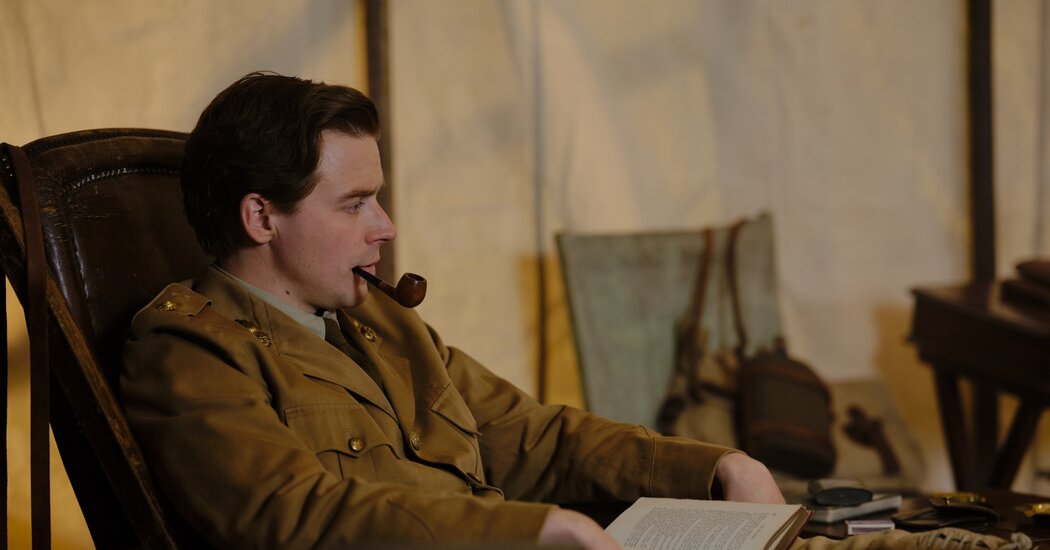
Since his first feature, “Distant Voices, Still Lives” in 1988, the British writer and director Terence Davies has made a handful of films that can be described — owing to their emotional subtlety and formal precision — as poetic. Recently, he has been making films about poets, which isn’t quite the same thing.
“Biopic” is a clumsy word for a prosaic genre, and screen biographies of writers are more apt to be literal than lyrical. I thought “A Quiet Passion,” Davies’s 2017 rendering of the life of Emily Dickinson, was an exception, as attentive to its subject’s inner weather as to the details of her time and place. Some of Dickinson’s admirers felt otherwise, but I still insist that the movie and Cynthia Nixon’s central performance brought the poet’s idiosyncratic, indelible genius to life.
“Benediction,” which is about the British poet Siegfried Sassoon, is in some ways a more conventional affair. Sassoon, whose life stretched from the late Victorian era into the 1960s, is primarily remembered as one of the War Poets. Their experience in the trenches of World War I inspired verse that changed the diction and direction of English literature, and Davies powerfully begins the film with archival images of slaughter accompanied by Sassoon’s unsparing words, drawn from poems, prose memoirs and letters.
Similar words and images recur at various points in a narrative that occasionally jumps forward in time but that mostly recounts the chronology of Sassoon’s postwar life. He is played in his 30s and 40s by Jack Lowden and as an older, unhappier man by Peter Capaldi, whose resemblance to late photographs of Sassoon is uncanny.
Having already acquired some fame as a writer while the war is still going on, Sassoon circulates a scathing antiwar statement in which he refuses further service on the grounds that “the war is being deliberately prolonged by those who have the power to end it.” Expecting a court-martial and prepared, at least in principle, to face a firing squad, he is instead called before a medical board, thanks to the intervention of a well-placed older friend named Robbie Ross (Simon Russell Beale). His pacifism is classified as a psychological disorder, and he is sent to Craiglockhart War Hospital in Scotland, where he discloses his homosexuality to a sympathetic doctor (Julian Sands) and befriends Wilfred Owen (Matthew Tennyson), a younger poet who will be killed in action a short time before the Armistice.
Sassoon’s subsequent social and romantic activities occupy much of the second half of “Benediction,” which means that his writing fades into the background. The portrait of an anguished artist becomes a somewhat familiar tableau of Britain between the wars, with Bright Young Things coming and going and speaking in beautifully turned, terribly cruel phrases. (“That was perhaps a bit too acerbic,” Sassoon is told by the victim of one of his barbs. “Mordant would be a more accurate word,” Sassoon replies.) Winston Churchill is mentioned as a chap one knows. Edith Sitwell, Lady Ottoline Morrell and T.E. Lawrence all make brief appearances.
Davies provides an unhurried tour of the privileged, educated gay circles that helped set the tone of the time. I realize that “gay” is a bit of an anachronism here, but many of Sassoon’s friends and lovers — including Ross, the composer and matinee idol Ivor Novello (Jeremy Irvine) and the legendary dilettante Stephen Tennant (Calam Lynch) — are conscious of belonging to a tradition that entwines sexuality with cultural attitudes and artistic pursuits. Oscar Wilde is invoked both as an idol and, because of his prosecution in the 1890s, as a cautionary figure.
Sassoon and his cohort are committed to discretion, irony and the occasional strategic compromise with heterosexuality. Sassoon’s marriage to Hester Gatty (Kate Phillips, and then Gemma Jones) is affectionate and without illusions, producing a son named George (Richard Goulding), who endures the cranky conservatism of his father’s old age.
Sassoon’s complaints about rock ’n’ roll and his conversion to Roman Catholicism feel more like duly noted biographical facts than expressions of character. Even the more intimate passages in “Benediction” — the affairs with Novello and Tennant, and the heartache that follows the end of each one — are more restrained than passionate. In part, this is a reflection of Sassoon’s own temperament, which he tells the doctor at Craiglockhart is marked by circumspection and detachment. But the film never quite conjures a link between the life and the work.
Except for an extraordinary pair of scenes involving not Sassoon’s work, but Wilfred Owen’s. Sassoon confesses to looking down on Owen when they first met, for reasons of class as well as age, but comes to regard him as “the greater poet.” History has mostly upheld this judgment, and Davies brings it home with astonishing force.
In the hospital, Owen asks Sassoon for his opinion of a poem called “Disabled,” which Sassoon pronounces brilliant after reading it silently. The audience will not hear Owen’s words until the final scene of the film, when the poem’s wrenching account of a young man maimed in battle is impressionistically depicted onscreen. Up until that moment, we’ve thought about the war, heard it rendered in poetry and caught glimpses of its brutality. And then, through the filter of Sassoon’s tormented memory, we feel it.
Benediction
Rated PG-13. Sex and warfare, discreetly handled. Running time: 2 hour 17 minutes. In theaters.




